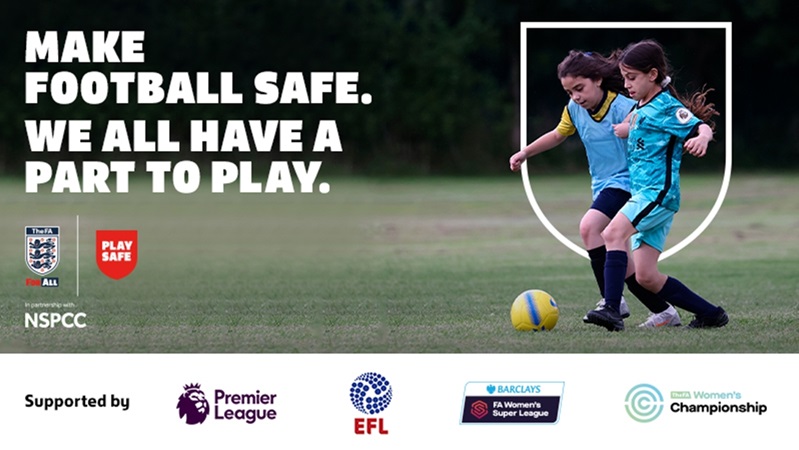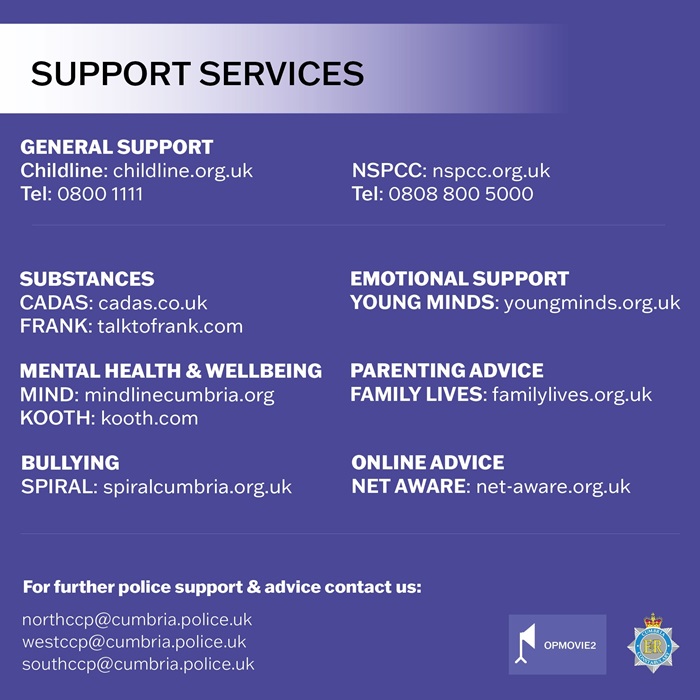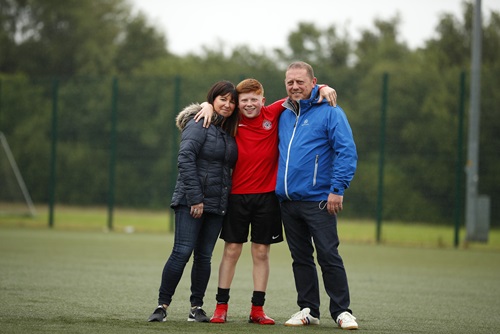Keep Up Play Safe
Cumberland FA’s ‘Keep up Play safe’ campaign has been launched to highlight that everyone involved with youth football, 16/17 year olds in open Age football, and those that work with Adults at Risk have a role to play in safeguarding, whether you are a spectator, volunteer or player.
We all need to take responsibility!
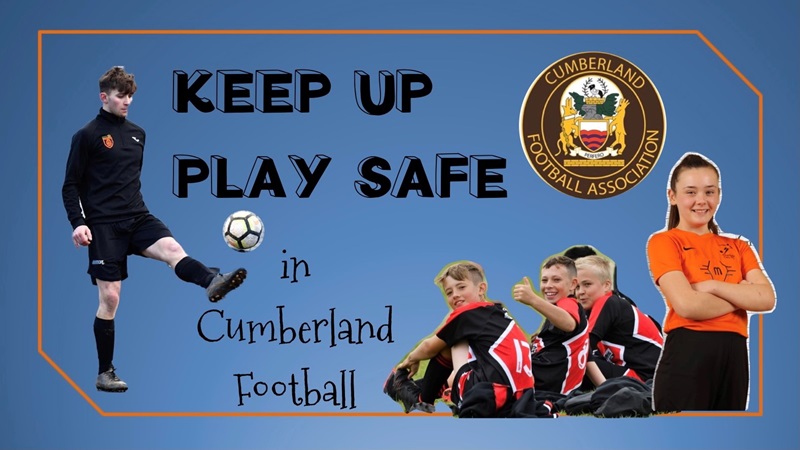
Safeguarding is at the heart of everything we do.
Join us as we aim to highlight that everyone has a role to play!
We want the Grassroots Football Community to get involved and help raise the profile of the #KeepUpPlaySafe campaign to ensure the message that ‘we all have a role to play in safeguarding’ is seen and heard loud and clear.
CLICK HERE TO SEE WHAT OUR STAFF GOT UP TO IN 2021
If your Team don’t want to make a video – You can still play your part!
Scroll down to check that you’re doing what you can to ensure a safe and positive environment for children, young people and vulnerable adults.
You can tag us on Social Media to let us know what you're doing to #KeepUpPlaySafe or pass the message around your Grassroots Football contacts so they can get involved.
Watch the Cumberland FA #KeepUpPlaySafe videos on our YouTube channel
Here are some things that you can do to support safeguarding across grassroots football in Cumberland (this list is not exhaustive), as a Club Volunteer, Coach, Player, Parent/Carer or Referee
You can use one of the examples on the list below for the video to show how you're doing your bit to #KeepUpPlaySafe
*By uploading your video to this campaign using #KeepUpPlaySafe and tagging Cumberland FA you are giving permission for Cumberland FA to use this footage to promote the campaign now and in the future.
Clubs
- As a club chairman, I ‘Keep Up to Play Safe’ by knowing that all committee members need to have done safeguarding training
- As a club secretary, I ‘Keep Up to Play Safe’ by making sure our club has an up-to-date safeguarding policy.
- As a member of my club committee, I ‘Keep Up to Play Safe’ by knowing what the FA’s whistle blowing policy is.
- As a club welfare officer, I ‘Keep Up to Play Safe’ by ensuring that all our club coaches and volunteers have up to date DBS checks.
- As a club welfare officer, I ‘Keep Up to Play Safe’ safe by making sure that coaches and volunteers have in date safeguarding training.
- As a club welfare officer, I ‘Keep Up to Play Safe’ by ensuring that everyone in my club knows who I am.
- As a club welfare officer, I ‘Keep Up to Play Safe’ by making sure club members know how to report any concerns they may have to me.
Coaches
- As a coach I ‘Keep Up to Play Safe’ by signing up to my club’s code of conduct and understand what behaviour is expected from me.
- As I coach I ‘Keep Up to Play Safe’ by knowing who my club welfare officer is and how to report concerns I may have about a child.
- As a coach I ‘Keep Up to Play Safe’ by keeping my DBS and safeguarding training up to date.
- As a coach I ‘Keep Up to Play Safe’ by checking in with my players regularly and can recognise when something isn’t right.
- As a coach, I ‘Keep Up to Play Safe’ by keeping the number for the NSPCC in my phone.
League Welfare Officer
- As a League Welfare Officer, I ‘Keep Up to Play Safe’ by ensuring the clubs in my league know who I am and how to contact me with concerns.
Referees
- I ‘Keep Up to Play Safe’ by knowing my DBS check and safeguarding education are up to date.
- I ‘Keep Up to Play Safe’ by wearing a yellow armband to show I am a youth referee in football.
- I ‘Keep Up to Play Safe’ by knowing how to report any concerns I may have relating to a child or poor practice to my County FA Designated Safeguarding Officer.
- I ‘Keep Up to Play Safe’ by reporting any misconduct against me during a match.
- I ‘Keep Up to Play Safe’ by helping to ensure that football is played in a fun and safe environment using the laws of the game to help protect players during matches.
Parents / Carers
- As a parent, I ‘Keep Up to Play Safe’ by knowing that we all need to take responsibility for safeguarding.
- As a parent, I ‘Keep Up to Play Safe’ by completing the free online Safeguarding Awareness Course for Parents & Carers course.
- As a parent, I ‘Keep Up to Play Safe’ by knowing who my child coach is, and that they are DBS checked.
- As a parent, I ‘Keep Up to Play Safe’ by knowing who my club welfare officer is and how to contact them if I have any concerns.
- As a parent, I ‘Keep Up to Play Safe’ by signing up to my club’s code of conduct and understand what type of behaviour is expected from me.
- As a parent, I ‘Keep Up to Play Safe’ by reading my clubs safeguarding policy.
- As a parent, I ‘Keep Up to Play Safe’ by encouraging my child to talk to me about any concerns they may have at football.
- As a parent, I ‘Keep Up to Play Safe’ by knowing what poor practice looks like and how to report it.
- As a parent, I ‘Keep Up to Play Safe’ by knowing that I can contact the NSPCC for general advice.
Players (U8 to and including U14 and to include disability teams)
- I ‘Keep Up to Play Safe’ by knowing that football should be fun
- I ‘Keep Up to Play Safe’ by knowing that I should always feel safe when I play football
- I ‘Keep Up to Play Safe’ by knowing that if a coaches behaviour makes me feel uncomfortable or worried that I need to tell someone
- I ‘Keep Up to Play Safe’ by knowing that I have signed up to my club’s players code of conduct
- I ‘Keep Up to Play Safe’ by knowing what behaviour is expected from me at training and matches
- We need you all to ‘Keep Up to Play Safe’ to help make sure that we can play the game we love in a fun and safe environment
Older children (16/17/18-year-olds and Adults at Risk)
- I ‘Keep Up to Play Safe’ by knowing that my coach is DBS checked.
- I ‘Keep Up to Play Safe’ by knowing that we have a club welfare officer that I can talk to if I need to.
- I ‘Keep Up to Play Safe’ by knowing what appropriate behaviour looks like and how to report something that isn’t right.
- I ‘Keep Up to Play Safe’ by knowing I have the right to feel safe on and offline.
- I ‘Keep Up to Play Safe’ by knowing that I have the right not to be discriminated against for any reason.
Our Play Safe campaign is endorsed by the NSPCC and will be supported this weekend across every level of English football, including the Premier League, EFL, Barclays Women’s Super League, Barclays Women’s Championship, National League and across the grassroots game.
This year’s Play Safe campaign focuses on the safeguarding role that everyone can play – coaches, players, parents/carers, spectators or volunteers – to keep children and young people safe, no matter what the football setting.
This season we are asking clubs and leagues at every level of the game to make a Play Safe Pledge and to tell us what they are planning to do to make a difference and highlight the importance of safeguarding over the Play Safe weekend. This includes grassroots youth team captains wearing Play Safe armbands and youth team coaches wearing Play Safe pin badges, up and down the country in support.
In addition, as part of this year’s Play Safe campaign, we are also promoting our free online Safeguarding Awareness Course for Parents & Carers to raise awareness around safeguarding and how to report any concerns. Our aim is for 100,000 people from across the game to have taken the course, which only takes 30 minutes to complete, by the end of 2024. The free course provides important information that guides parents and carers through questions they should ask to ensure the club or venue where children play football has the correct safeguarding policies, people and practices in place.
SUPPORT SERVICES
Support services available for children and families [Information provided by Cumbria Police]
Visit the Children and Young People page on the Cumbria Police website
Visit Cumbria Safeguarding Children Partnership
Aimed at Parents, Carers and Guardians and aims to provide information regarding safeguarding and related matters that may be worrying you. Information can be found on a variety of topics below and you will also find some useful links and contact details to information and support services in Cumbria and nationally.
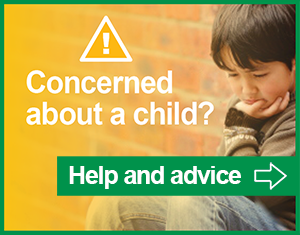
'KEEP UP' TO DATE
Visit England Football Learning to find information on The FA's Safeguarding courses.
Player Welfare in Open Age Football - This course is for coaches, club welfare officers and committee members within open age football (teams with players aged 16+), and will look at player welfare while covering a range of topics.
Safeguarding Children Course - This course provides an awareness of best practice in safeguarding children in football.
Safeguarding Awareness for Parents and Carers - This free, online course is designed to help you to make an informed choice about the football setting you enrol your child in.
Safeguarding Children Course Recertification - This course is available for free for anyone who has previously completed the Safeguarding Children Course or The FA Safeguarding Children Workshop.
Safeguarding For All - This course is for everyone. It provides a basic overview of how to safeguard children and examines what we mean by: Best practice; Poor practice; Abuse.
Welfare Officers Course - This interactive, online session covers the role of a Welfare Officer and wider safeguarding frameworks.
Safeguarding for Committee Members - The FA Safeguarding for Committee Members course awards a digital certificate.
Safeguarding Adults Course - This free, online module explores how to safeguard adults as well as defining an ‘adult at risk’.
Visit england football learning here
#KeepUpPlaySafe in Cumberland Football
IMPORTANT INFORMATION FOR OPEN AGE (ADULT) FOOTBALL CLUBS
Whilst the focus of safeguarding is often seen to be on youth football, it is equally as important that 16 and 17 year old footballers feel safe whilst taking part in the open age (adult) game and that Clubs take responsibility for the safeguarding of any young players that they have.
Open Age (Adult) Club’s should recall various communications that they received in the early part of 2020 with regards to their safeguarding responsibilities for both under 18s and also adults in disability football.
Clubs should:
• Ensure that the information regarding their Club is up to date on the Whole Game System and the names of all Managers / Coaches are recorded against the team(s) that they are involved in.
• Ensure that your coaches have a DBS check where your team has 16/17-year-old players.
• Ensure coaches have completed the free online ‘Safeguarding for ALL’ course where your team has 16/17-year-old players
• Ensure that you have your safeguarding policy in place. Information of what this should include can be found here
• Ensure that the Know Your Rights in Football document is shared with any 16 and 17 year old players at the Club
• Check out the latest safeguarding information on CumberlandFAcom
Adult Clubs or teams with registered players who are aged 16 & 17 years old must name:
• An Adult Club Welfare Officer
SAFEGUARDING POLICY FOR CLUBS WITH 16/17 YEAR OLD PLAYERS
If you have any questions at any time regarding safeguarding in Cumberland Football, please contact the team at Cumberland FA.
VISIT THE SAFEGUARDING & WELFARE PAGE ON WWW.CUMBERLANDFA.COM
Cumberland FA's Designated Safeguarding Officer is Steve Greenway and can be contacted on 01900 511 800 (Option 1 and then Option 1) Mobile 07704 156780 or via email Safeguarding@CumberlandFA.com

Under 18 Corner

Know Your Rights

Safeguarding Adults Week 2023

Anti-Bullying Week 2023
CLUBS | HOW YOU cAN KEEP UP TO PLAY SAFE
Some More ways to communicate how your club provides a safe and positive environment for every child and young person:
Ask your Committee members to:
o Ensure your Club Welfare Officer’s (CWO) contact details are widely available;
o Ensure safeguarding and player welfare is regularly on your meeting agendas and reflected in your club’s day to day practices;
o Discuss with your CWO a) what’s going well and b) what could be improved at your club – then agree three key priorities to drive positive change.
Ask your coaches and managers to:
o Find out first-hand from your under-18 players:
- What they feel is working well at the club;
- Anything they’d like to change.
Remind players that if they have any concerns they can speak with the coach/manager, the Club Welfare Officer or their parent/carer.
Ask parents/carers to:
o Put the CWO/NSPCC helpline number in their phone;
o Introduce themselves to the CWO;
o Ensure you know who their coach is;
o Discuss the club’s code of conduct with their child - and make sure they understand it;
o Complete The FA Safeguarding For All free online course;
o Regularly check-in with their child to see what they are enjoying/not enjoying at football and why;
o Reflect on whether they are:
- Keeping to the club’s code of conduct, in what they say and do;
- Recognising that under-18 referees are children and should receive the same support as every other under-18 in the game.

Safeguarding & Welfare



